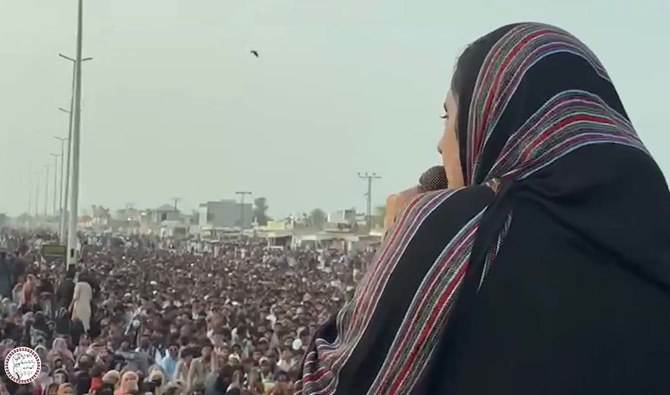QUETTA: An ethnic Baloch rights group on Monday gave the provincial government 48 hours to release all detained members, warning that it would expand its ongoing protest, now in its third day, across Pakistan’s southwestern Balochistan province if its demands were not met.
The Baloch Yakjehti Committee (BYC) led by 31-year-old human rights activist Dr. Mahrang Baloch held a protest gathering on Sunday in the port city of Gwadar against alleged human rights abuses, extra-judicial killings and enforced disappearances in Balochistan that rights activists and the families of victims blame on Pakistani security forces. The government and security agencies deny involvement.
On Saturday, protest leaders and officials confirmed over a dozen people who were en route to Gwadar to take part in Sunday’s demonstration were injured in clashes with paramilitary forces in Balochistan’s Mastung district. The BYC says one person was also killed in the violence, which officials say they are investigating. There has also been a complete Internet and mobile service blackout in the Gwadar and Kech districts, while the protests are currently centered in the cities of Gwadar, Mastung and Turbat.
“If the government doesn’t accept our demands, we will expand our protests across Balochistan,” Beberg Baloch, a BYC leader who is leading the protests in Mastung, told Arab News on Monday, adding that the group wanted all its arrested members released within 48 hours and provincial highways opened so people could move freely to protest sites.
Beberg said the group’s leaders, including Dr. Mahrang, were currently in Gwadar and open to talks with the provincial government.
Deputy Commissioner Quetta Saad Bin Asad said 22 people had been arrested in the provincial capital as they were disrupting traffic by blocking a main road.
The Balochistan province, which borders Iran and Afghanistan, has been the site of a low-level separatist insurgency for the last two decades. The insurgents say they are fighting what they see as the unfair exploitation of the province’s mineral wealth by the federation. The Pakistan government and army say they are working for the uplift of the impoverished province.
Balochistan is also home to Pakistan’s only deep-sea port at Gwadar, a crucial trade route for the $46bn China-Pakistan Economic Corridor (CPEC) that was initiated by the Chinese government to link southwestern China to the Arabian Sea through Pakistan.
Provincial home minister Meer Zia Ullah Langove said the latest protests were a “conspiracy” against CPEC, alleging a “foreign hand” in instigating the protests.
“Despite being attacked by the protesters, people of Balochistan, police, and security forces have shown restraint to maintain peace,” Langove told Arab News.
“The government considers the protesters as our brothers and sisters, we have to treat them with respect and we are ready to talk with them,” Langove added. “But defaming the state and [playing] personal politics on these [rights] issues has escalated the tensions.”
Meanwhile, life in various cities of Balochistan remained at a standstill for the third consecutive day, with protesters still blocking highways N-25 Quetta- Karachi, M-8 Turbat- Hoshab and a coastal highway that connects Gwadar with Pakistan’s commercial hub of Karachi.
















